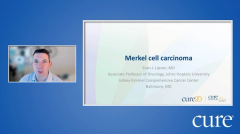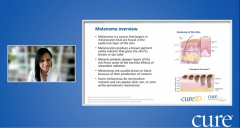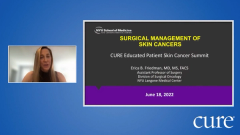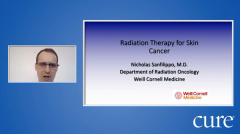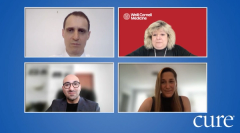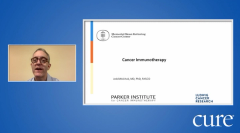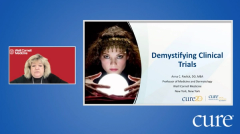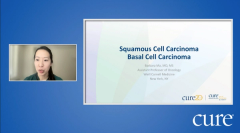
Educated Patient® Skin Cancer Summit Merkel Cell Carcinoma Presentation: June 18, 2022
Watch Dr. Evan J. Lipson, from Johns Hopkins Medicine, discuss Merkel cell carcinoma, during the CURE Educated Patient Skin Cancer Summit.
Since the mid-1980s, the incidence of Merkel cell carcinoma has exploded among the general population, according to Dr. Evan J. Lipson.
The reasons behind this significant increase, he said, are uncertain. But Lipson, who is an associate professor of oncology at Johns Hopkins Medicine in Baltimore, noted that researchers have hypothesized as to why cases of this rare, and extremely aggressive form of skin cancer have more than quadrupled over the past few decades.
During the CURE® Educated Patient® Skin Cancer Summit, Lipson highlighted why health care providers believe the incidence of this disease is on the rise as well as how treatment advances have reshaped survival estimates in patients where long-term survival was rare.
Looking into Merkel Cell Carcinoma
Each year, Lipson said, there are approximately 3,000 cases of the aggressive skin cancer in the United States.
He noted that most patients are aged 65 years or older and are often immunosuppressed. A patient is usually immunosuppressed, he explained, if they have a diagnosis of a chronic leukemia or have a disease where the immune system doesn’t work the way it normally should.
Moreover, White patients are more likely to develop this form of skin cancer. Interestingly, Lipson continued, patients who live closer to the equator are more likely to be diagnosed with Merkel cell carcinoma.
But why has the incidence of this cancer risen over the past few decades?
Although there are no definitive answers, Lipson spoke to a few possibilities behind the increase.
First, he said, was the development of better laboratory testing. Twenty-five to 30 years ago, testing was limited to help providers identify if the skin cancer was classified as Merkel cell carcinoma. Now, according to Lipson, when a dermatologist or surgeon performs a biopsy of the tumor, they’re certain in a majority of cases that it is Merkel cell carcinoma.
He also discussed the effects of immunosuppression further.
“One of the risk factors for developing Merkel cell cancer is being immunosuppressed, or the immune system doesn't quite work the way it should,” he said. “People are (now) taking medications over long periods of time, sometimes decades, that suppress the immune system that sort of turn down the activity of the immune system. And that can be helpful if you turn down the activity of the immune system, you can decrease the severity of certain diseases.”
For example, he said, an immunosuppressive medication may help someone with rheumatoid arthritis. However, the same medication may make the immune system less aware that there are cancer cells developing, according to Lipson.
Overview of Merkel Cell Carcinoma Treatments
Patients with this rare form of skin cancer are often initially treated with surgery, which is usually followed by radiation therapy. And although 95% of patients are free of disease after this treatment method, more than half of patients, Lipson said, develop recurrences.
For patients whose disease spread (or metastasized) to other sites in the body, treatment consisted of standard chemotherapy.
“If you look at what happened at the three-year mark, for many of those patients who were treated with chemotherapy in the setting of metastatic Merkel cell (carcinoma) having spread throughout the body, only about 10% of patients were alive at the three-year mark,” he said.
By 2008, however, researchers were starting to understand the biology of how the rare skin cancer formed. The first thing providers learned, he said, was that there were two forms of Merkel cell carcinoma.
The one form was attributed to sun exposure, which damages a patient’s DNA. The other form is related to a virus, known as the Merkel cell polyomavirus.
“In some unlucky patients, that virus causes the development of a tumor,” he said.
In both cases, Lipson mentioned that a person’s immune system is on high alert. But the question remains, how does the immune system get into gear to attack the harmful cells?
Unleashing the Immune System
With the development of certain medications over the years, providers are now able to administer therapies that help “pull off the parking brake,” according to Lipson.
He noted that in one study, the use of immunotherapy in patients with metastatic Merkel cell carcinoma was associated with a significant increase in three-year survival rates. For instance, with chemotherapy, as he previously mentioned, survival was approximately 10%. Now, with immunotherapy, 60% of patients were alive at three years.
“We've made a lot of progress, (but) we certainly still have a lot of work to do,” he said. “But we are definitely better off now than we were six or seven years ago.”
For more news on cancer updates, research and education, don’t forget to

